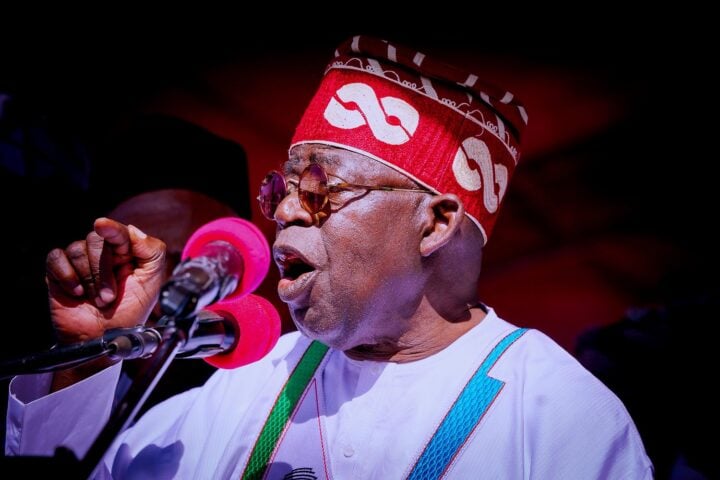Bola Tinubu’s renewed hope (II)
Bola Tinubu has an interesting take on inflation, which is ravaging the pockets of Nigerians at 21.47 per cent today, largely due to the dislocations caused by COVID-19, especially the necessary spendings of that era geared at reviving the economy. He acknowledges that every country in the world had to engage in that counter-cyclical spending […]

Bola Ahmed Tinubu
- Bola Tinubu has an interesting take on inflation, which is ravaging the pockets of Nigerians at 21.47 per cent today, largely due to the dislocations caused by COVID-19, especially the necessary spendings of that era geared at reviving the economy. He acknowledges that every country in the world had to engage in that counter-cyclical spending to revive their economy, thus leading to deficits and inflation. He however, disagreed with the idea of raising interest rates stratospherically, hurting the private sector, in a bid to slowing down inflation. He suggested a focus on productivity instead. What I heard was; ‘We can work and produce our way out of this quagmire. It will not be easy at all. But we also don’t have a choice than to produce and add value’.
- As with many of his writings and speeches, Tinubu excoriated the almost total reliance on foreign borrowing – which comes with a debilitating exchange risk. He challenged his listeners to think more broadly. He does not believe in the dollarization of the Nigerian economy but in the leveraging of our sovereign currency to solve more of our problems. This is a very bold proposition, worthy of further analysis.
- The APC candidate further sensitized Nigerians to the need to move past the fuel subsidy era, especially because it opens Nigerians to being defrauded by a few. The integrated transportation system being proposed for all states in the federation will be enhanced to reduce the burden because 70 per cent of fuel is used for transportation. Lagos State is already showing the beginnings of an example.
- For agriculture, Asiwaju intends to extend the ideas of Buhari in prioritising the growth of that sector, increasing the proportion of cultivated land in Nigeria, and returning to the era of commodity boards which serve to protect farmers of cash crops from the downsides of a slump in prices. The boards, which were removed with Babangida’s ill-fated foray into orthodox, far-right economics under what was known as Structural Adjustment Programme in 1986, have turned out to be very beneficial still in the case of cocoa in Cote D’Ivoire and Ghana, which now produces ten and three times the volume of Nigeria’s cocoa respectively. Our farmers have been in limbo and disarray, and at the mercy of less-than-honest brokers of unknown origin. But at the same time as Asiwaju is proposing commodity boards, he is also moving for a modern solution to solving the problem – empowerment of commodity exchanges where farmers can get some assurances of future prices and also get forward contracts.
- The centrality of infrastructure to economic growth and development was also emphasised by the candidate, who committed to the ‘faithful implementation’ of the Infrastructure Master Plan, especially Nigeria’s perennial issues with the power sector. He promised further private-sector-led reforms and also the promotion of alternative, green and clean energy, which will help with the climate change conundrum without slowing down Nigeria’s quest for rapid growth, employment creation, poverty eradication and the enhancement of productivity. A large part of the candidate’s plan is promised to be driven by Information and Communication Technology (ICT), keying into contemporary knowledge thrusts in Artificial Intelligence, Internet of Everything, Big Data, Robotics and the Fourth, Fifth and Sixth Industrial Revolutions which are already afoot and/or in play.
- Small businesses which provide 80 per cent of jobs in Nigeria also got a mention, with Asiwaju promising to continue to help such businesses reduce the challenges to Ease of Doing Business in Nigeria, perhaps by looking at some of the Nigerian peculiarities like multiple ‘tax’ burdens, infrastructure, transparency, and public-sector corruption. Asiwaju promises a positively disruptive governance.
- Another revolutionary promise by Bola Ahmed Tinubu is the quest to reduce interest rates with a view to spurring a consumer credit and mortgage revolution. The consumer credit will be geared at locally produced goods, thereby generating more employment, while the mortgage revolution will be powered by Nigerian banks and will seek to transform the face of low-income housing in Nigeria in a significant manner. This is a veritable gamechanger and can contribute significantly towards the double-digit GDP growth target.
- There was also a promise to tackle exchange rate differentials and to enable the fashion and entertainment sector players where millions of youths are employed to be able to contribute their quotas to economic development further by remitting their proceeds home rather than maintaining their wealth abroad. This also goes for other players like commodity and manufactured goods exporters.
- Lastly, and very comfortingly, Asiwaju restated his worldview, which is that government in an economy at our stage of development, cannot be absent in the lives of people and cannot shirk all its responsibilities and capitulate to the capture of a few in the private sector. He has an expansive view of the economy and prosperity and comfort, through hard work, for the people of Nigeria. He says that he doesn’t believe that Nigeria has provide enough for her people through our yearly budgets and so we can do a whole lot more. He also challenged all to think in kaleidoscopic fashion, for a diversified economy, while we consolidate on the petroleum sector and remove bottlenecks to the implementation of the Petroleum Industry Act.
Unbiased minds will begin to see that the image of our dear nation is about to be repositioned for good under the leadership of this man, and the kind blessings and forbearance of the Almighty. Nigeria had floundered enough. May all the stars in the firmament align spectacularly for our redemption this time.
